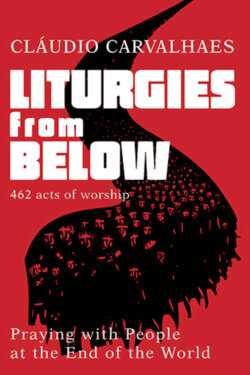Читать книгу Liturgies from Below - UK Edition - Carvalhaes Claudio - Страница 7
На сайте Литреса книга снята с продажи.
PREFACE
ОглавлениеWorship Creates Counter-Imperial Alternatives
Worship is fundamental to the Christian calling and spirituality. Devotional surrender provides the basis for a spiritual life that instantiates life-giving bonds in the whole of creation that is continuously killed by Empire. Worshipping God is itself an act of rebellion, as Empire demands to be worshipped alone. In the context of Empire, it is not the absence of spirituality or religiosity per se that has become the challenge but a kaleidoscope of spiritualities manufactured by the hegemonic paradigm of neoliberal politics and economics in worship to Empire. As the book of Revelation shows, worship to “the Lamb who was slain” (13:8) subverts worship to the power and religion of Empire.
Worship is central to the calling and being of the church as faith community. Church is a community who gathers together in worship to affirm their faith in the Divine as well as the Divine mission of redemption and healing. Worship inspires and anoints the community to translate this mission into radical social transformation in the here and now by enabling their agency to turn the world upside down. In worship we celebrate the spirituality of resistance and reconstruction.
Prayer, according to Jewish theologian and rabbi Abraham Joshua Heschel, “is meaningless unless it is subversive, unless it seeks to overthrow and to ruin the pyramids of callousness, hatred, opportunism, falsehoods.”1 To put it differently, worship is a subversive activity that contests and overthrows the prevailing sinful order of injustice and inequality. For Moses, the burning bush experience at Mount Horeb was not only an alternative experience of theophany; it was also a tutorial for an alternative understanding of worship. The alternative experience of theophany enabled Moses to reimagine God as the vulnerable One, deeply affected by the scars of slavery. In the vision of the burning bush, Moses encountered God as a co-sufferer who was embodied in the life stories of pain and struggles for freedom and dignity of the enslaved communities. The sacramental and liturgical symbol of fire in the burning bush provided Moses with an alternative understanding of worship. Worship should instill in the enslaved community the audacity to believe that the blazing fire of the Empire cannot destroy the beauty of life. The green leaves in the liturgy of the burning bush empowered Moses to believe in the possibility of a beyond of Egypt.
Worship is therefore a life-changing experience where we are invited to realize and denounce our power and privileges in order to become credible and authentic comrades of the communities at the margins who are engaged in the salvific mission of turning the world upside down.
The dominant always uses religious institutions and rituals to create and legitimize new idols that ensure their prosperity and power. Idolatry is nothing but the fetishization of our imperial projects, and liturgy in the context of idolatry celebrates the sacrifice of the powerless and the voiceless in the altar of patriotism, progress, family values, racism, casteism, patriarchy, heteronormativity, and cultural nationalism. Ungods have been created in history to offer spiritual and theological legitimization to the pyramids of injustice and exclusion. We are more comfortable with depending on the mercy of the ungods who rule us than with the empowering presence of the liberating God. Religion—with its distorted theology, liturgy, and morality—continues to incorporate its followers into the band of idol worshippers. We have become devotees of the Golden Calves. This is the context in which we need to reimagine worship as rituals of defiance and alternatives.
So “Let my people go so that they can worship me” does not mean that God’s liberative mission is to enable us to worship God in a safe and comfortable space; rather, the very struggle for liberation is the act of worship. Let us paraphrase Rabbi Heschel’s interpretation of prayer contextually. Worship is our political engagement to overthrow and ruin the pyramids of economic injustice and social exclusion such as casteism, patriarchy, and heterosexism. Such discernment helps us go beyond our binary thinking of worship, social work, ministry, and social action.
Egypt is around us and within us, and we need to discern it and gather the prophetic courage to destroy the Golden Calves of our times. It is our faith imperative to occupy our churches, our spiritual practices, and our institutions so as to reclaim them from the worship of the ungods. It is in our unending journey toward freedom, dismantling the pyramids of systemic sin and evil, that we worship the God of life in truth and spirit.
